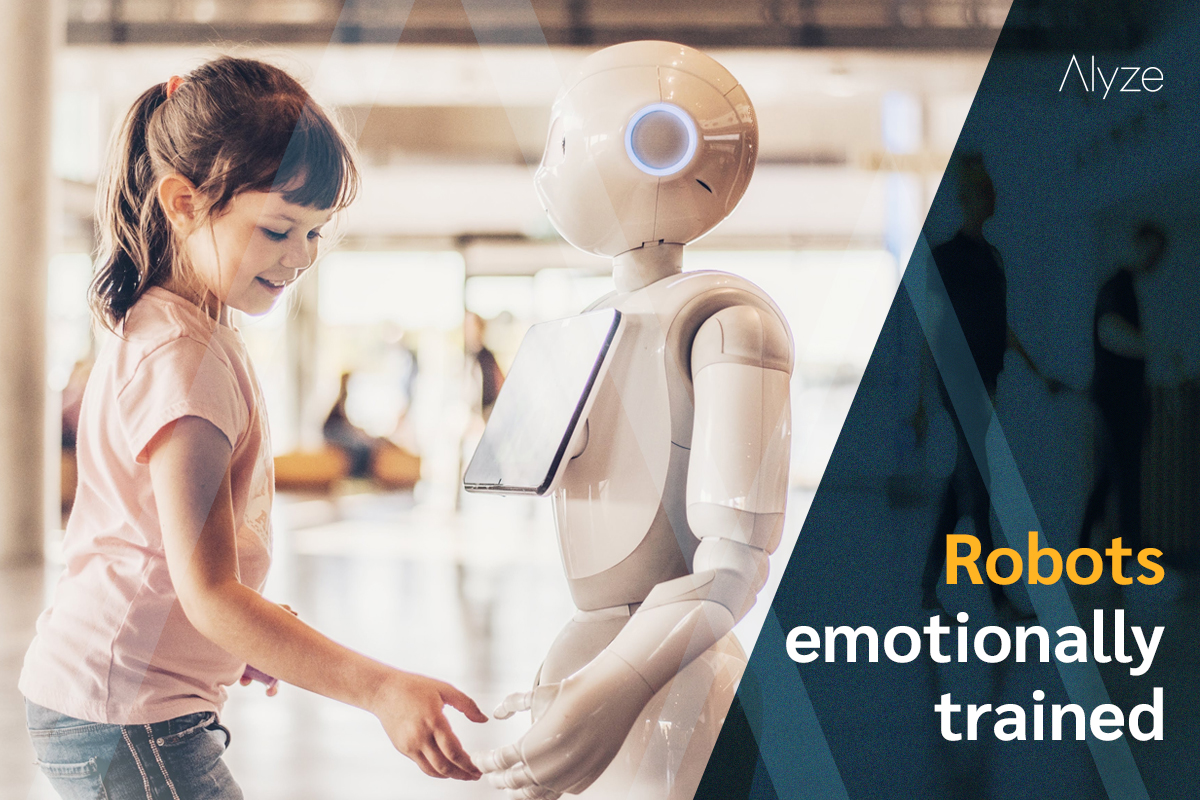
From Science Fiction to Reality: Emotionally Trained Robots are Here
- 1.Social robots in elderly care
- 2.Greeted at a hotel by a robot
- 3.A robot theme park entertainer
- 4.Takeaway
Artificial Intelligence (AI) is making robots more intelligent, social, and capable of interacting with people.
In the past, robots were limited to industrial settings due to limited AI software and data, but with the advancements in AI and faster processors, researchers are starting to upgrade robots and free them from the factory floor.
When you add emotion recognition to the mix, you get an upgrade to what robots are able to do. This will allow robots to understand, respond to, and even express human emotions which will enable robots to interact with people in a more human-like manner, making them more socially and emotionally intelligent.
Social robots in elderly care
By 2050, 17% of the world population will be over the age of 65. A significant jump from the current 8.5% we have today.
Today’s shortage in staff for elderly care might become extreme by 2050 and people will have to choose between a social robot or not having care at all.
But developers are already stepping up to the challenge with two prototype robots to help in this field.
EnrichMe is a mobile robot designed to assist elderly people with tasks such as exercising and remembering where they have put things. The robot has been tested in retirement homes in Europe with early results showing positive user acceptance.
Another robot called Mabu is a "smart home companion" that helps extend patients' contact with doctors by reminding patients at risk of heart failure to take their medicine. Mabu is designed to have a warm, engaging personality, and is able to provide personalized health coaching and provides doctors with a better understanding of how their patients are progressing.
While some people are wary of robots, roboticists are focusing on developing robots that can mimic human-human interactions.
Greeted at a hotel by a robot
Pepper is a humanoid robot created by SoftBank Robotics that was designed to interact with people in social settings like hotel lobbies.
It started being used in hotels to help with the workload during the COVID-19 pandemic. Pepper was programmed to greet guests in the lobby while wearing a mask and reminding guests to wear one as well. It also conveyed uplifting messages and was tasked with maintaining the hotel operations.
Global hotel chains like Marriot and Hilton used Rosé, a 3-foot-tall android to ensure social distancing at their premises. Rosé was used to deliver items like pillows, towels, and groceries to guests, who prefered a touchless experience.
Using emotion recognition would lead to an improved user experience and increased satisfaction, as the robots can provide more personalized and empathetic interactions. The robots can also use the information gathered from emotion recognition to adapt to the user's mood and provide a more engaging and entertaining experience.
A robot theme park entertainer
RoboThespian, a humanoid robot created by Engineered Arts, has been designed to be an entertainer, actor, salesperson, and teacher. It’s equipped with features such as speech and song capabilities, animated LCD eyes, beam-forming microphones, and other features that allow it to interact with crowds.
This charismatic robot can perform a range of speech, songs and movements, and can be customized to suit the client's needs and target audience. All its gadgets allow it to connect with crowds and deliver an interactive experience.
How could it benefit from including emotion recognition with facial expressions?
It could improve RoboThespian's ability to better understand and respond to human emotions and reactions. This would allow the robot to interact with people in a more natural and intuitive way, potentially enhancing the overall experience for users and making the robot more effective at achieving its goals, such as entertaining, educating, or selling. By using advanced computer vision and machine learning algorithms, RoboThespian could potentially detect and interpret various facial expressions, such as happiness, sadness, surprise, anger, and disgust, and respond accordingly, creating a more engaging and personal experience.
RoboThespian has been installed in over 30 countries worldwide, including the USA, Australia, and the UAE, and has performed at various theme parks and attractions. Engineered Arts is continuing to innovate its line of humanoid robots, including RoboThespian, to create more lifelike and engaging experiences for guests in theme parks.
Takeaway
With the inclusion of emotion recognition, robots can now understand, respond to, and express human emotions, making them more socially and emotionally intelligent.
By incorporating advanced computer vision and machine learning algorithms, robots could detect and interpret various facial expressions, creating a more engaging and personal experience.
At Alyze we can help in this process by giving the emotional analysis that our clients need to better interact with their customers. You can now emotionally train your business with our tool.
Check it out here and see for yourself.